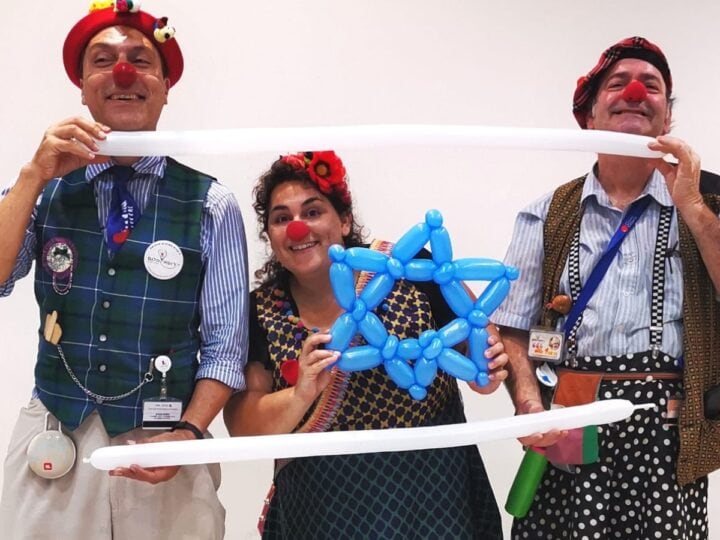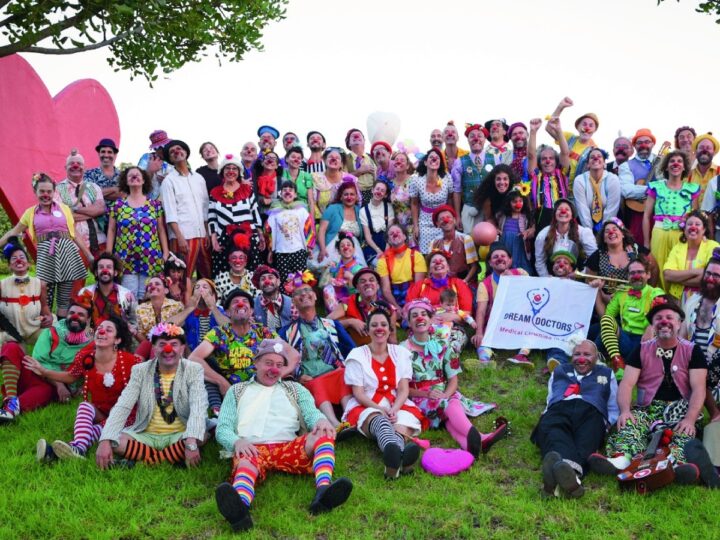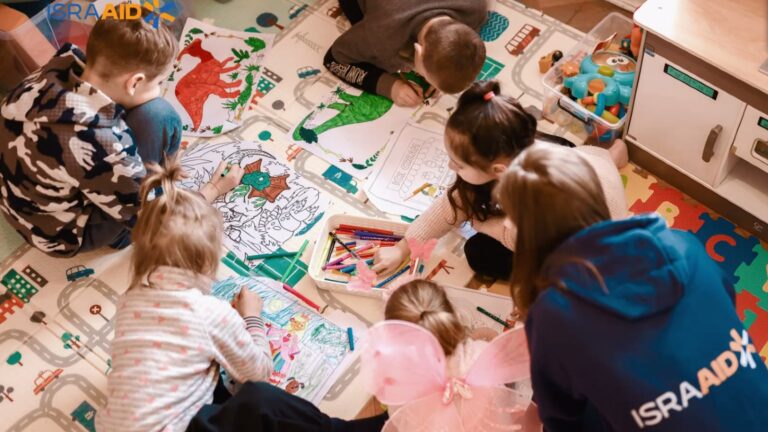
“He arrived yesterday with his older brother, with a bandaged leg and an amputated foot. He was lying on a stretcher in the surgery tent. The battalion medic (a man with a HUGE heart and full of love) turned to me: “Go ahead, Dush! This kid’s for you.” Yes, sir! It’s an order!”
So begins the moving account of David Barashi, a.k.a. “Dush,” an Israeli therapeutic clown working in the Israel Defense Forces field hospital in Nepal along with four colleagues specially trained for disaster situations.
No other country includes medical clowns in its overseas disaster-relief crew. But Israel has blazed a trail in professionalizing clown therapy through the Dream Doctors Project, a privately supported program that oversees 110 trained medical clowns working at 29 hospitals across Israel.
Israeli research on professional therapeutic clowns has shown that their inclusion on a medical team has measurable benefits in pain relief, stress reduction and boosting immunity. They are now used in Israel anywhere from adult and children’s wards, to operating rooms, delivery rooms and with sexual abuse victims.
Dream Doctors previously joined Israeli relief teams in Thailand, Indonesia and Haiti, says Karin Schneid, project coordinator for the Philnor Foundation, which supports the project.
“They’ve developed a unique methodology for working with trauma in disaster zones. They are trained by professionals here in Israel before their missions,” Schneid tells ISRAEL21c.

“We believe we do unique work that no one else will do. Our clowns have proved very useful in the past and it’s important for us to be part of this effort,” she added.
Two Dream Doctors arrived in Nepal on May 2 to assess needs, and another three followed the next day. Schneid reports that the team is working from early morning to past midnight.
The clowns are not part of the official Israeli aid delegation; their expenses are covered by individual and corporate donors. “We had a campaign in the last couple of days to raise funds for this mission, and allocated part of our existing budget to this as well. If we can, we might send two more clowns,” Schneid says.
“Years ago when we introduced clown therapy into the adult patient sector, we entered unchartered territory,” says Larry Rich, director of development at Emek Medical Center. “Since then, the therapeutic influence of a medical clown’s presence has been well documented, so the step into the traumatic world of post-earthquake Nepal was another natural step in unconventional therapy.
“The key is to take a patient’s mind off their pain and immediate situation and transfer them to a magical world of fantasy and fun. The Dream Doctors do just that and more, and are proving that even the trauma of a devastating earthquake may be temporarily moved aside to make way for smiles and laughter.”
‘The children would not let us go’
“Dush,”a long time medical clown at Hadassah Medical Center in Jerusalem, was joined by Yaron “Prof. Sancho” Goshen from Emek Medical Center in Afula; Nimrod “Max” Eisenberg and Smadar “Shemesh” Harpak from Dana-Dwek Children’s Hospital at Tel Aviv Medical Center; and Rotem “Fruma” Goldenberg from Wolfson Medical Center in Holon.
On the Dream Doctors Facebook page, Dush continues his story of the boy with the amputated foot:
“My eyes meet his in an unclear look,wondering if I’m just another of the strangers around him? Those smock-wearers, those dressed in uniforms, with those weird objects. But then he notices I’m a bit different … a bit strange and unreal.
“I return his gaze with my mischievous smile. … It’s now both of us in a moment that’s as strong as life itself. I approach him slowly, I gesture, he responds with a surprised smile. It’s a world without language, in which everything is clear, without disputes. Now I find we’re in a duel with swords. …
“The odor of the wounded leg comes and goes, threatening to end our game. Lucky I have a red nose, a nose which protects me from bad smells, from disasters…Now one of the doctors becomes a ‘victim’ — when he turns around, I stick a balloon in the middle of his butt. He laughs loudly, a rolling laugh of pain and wounds.”
The boy needed further surgery but the staff waited until his parents could be brought from their village. In the meantime, Dush kept the child and his brother entertained with a wheelchair race and squirting one another with water from medical syringes.

Schneid says there are many other “amazing stories” like this coming from the Dream Doctors — who are not only working at the field hospital with doctors who already know and trust them from civilian situations — but also are helping Israeli Embassy officials ease fears among displaced persons.
“Max” reports: “Near us there is a camp of Nepalese soldiers’ families, which accommodates 200 women and children sleeping in tents. A week after the earthquake, diseases are starting to spread, and in this camp the residents suffer from stomach problems. In order to even get close to them, we were required to keep contact precautions.
“Nevertheless, we insisted on visiting them. We paraded around the camp and improvised a one-hour clowning show together with these sweet people. We sang and danced, and in the end, the children would not let us go until we ‘high-fived’ them, gloves and all. This place is where once in a lifetime experiences happen 10 times a day.”
Click here to listen to an ISRAEL21c interview with the Dream Doctors.
Click here to watch an NDTV video about Israel’s Dream Doctors in the IDF field hospital.

















